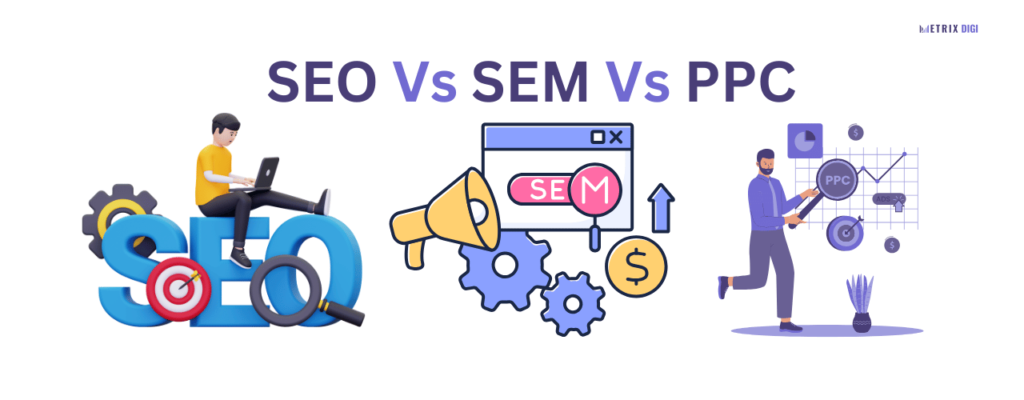Search engine optimization (SEO) is one of the most powerful tools for businesses today. With millions of users relying on search engines daily to find information, products, and services, it offers a unique opportunity to increase your online visibility, attract your target audience, and grow your business. Whether you run a small local shop or a large international company, SEO can help you achieve your goals effectively and affordably.
In this guide, we will explore everything you need to know about search engine optimization (SEO). From understanding its importance to implementing effective strategies, we will cover all the essentials in simple, easy-to-understand language.
What Is SEO – Search Engine Optimization?
Search Engine Optimization (SEO) is the process of improving a website’s visibility on search engines like Google, Bing, and Yahoo. The goal of SEO is to attract organic (non-paid) traffic by ensuring that a website appears at the top of search results for relevant keywords. SEO involves a combination of strategies, techniques, and practices designed to optimize the content, structure, and performance of a website.
For example, if someone searches for “best smartphones under $500,” SEO ensures that your website appears as a helpful and relevant result. SEO focuses on understanding how search engines work, what users search for, and how to provide the most relevant and engaging content.
How Is SEO Different From SEM and PPC?

While SEO focuses on organic traffic, Search Engine Marketing (SEM) and Pay-Per-Click (PPC) involve paid advertisements to appear in search results. Here’s a quick breakdown:
- SEO: Focuses on optimizing a website to rank higher in organic search results.
- SEM: A broader term that includes both SEO and paid search advertising.
- PPC: A paid strategy where advertisers pay each time their ad is clicked.
For instance, when you see an “Ad” label next to search results, that’s PPC. SEO, on the other hand, aims to earn those clicks without paying for ads, making it a more sustainable and cost-effective long-term strategy.
Why Is SEO Important?
SEO is crucial for businesses and individuals who want to establish a strong online presence. Here’s why:
- Increased Visibility: SEO helps your website appear on the first page of search results, where most users look.
- Cost-Effective Marketing: Unlike paid ads, organic traffic driven by SEO doesn’t incur ongoing costs.
- Better User Experience: SEO improves site structure and content, making it easier for visitors to navigate.
- Higher Credibility: Users often trust organic results more than paid ads.
- Long-Term Benefits: While paid ads stop driving traffic once you stop paying, SEO efforts continue to pay off over time.
Types of SEO and Specializations
SEO can be divided into different types and areas of specialization:
On-Page SEO
- Focuses on optimizing individual pages of a website.
- Includes using relevant keywords, writing high-quality content, and optimizing meta tags (titles and descriptions).
Off-Page SEO
- Involves activities outside the website to improve its authority and rankings.
- Includes building high-quality backlinks, social media engagement, and influencer marketing.
Technical SEO
- Ensures that a website is technically sound and easy for search engines to crawl.
- Focuses on site speed, mobile-friendliness, and secure connections (HTTPS).
Local SEO
- Targets local audiences by optimizing for location-specific keywords.
- Examples: “Best pizza near me” or “Plumbers in New York.”
E-commerce SEO
- Focuses on optimizing online stores to drive sales.
- Includes optimizing product pages, category pages, and implementing structured data.
How Does Search Engine Optimization Work?

SEO works by aligning your website with the ranking factors used by search engines. These factors can be divided into three main categories:
- Crawling: Search engines use bots (crawlers) to scan the internet and discover new content.
- Indexing: Once content is discovered, it is stored in a database (index).
- Ranking: Algorithms analyze indexed content and determine which pages are most relevant to a user’s query.
Key elements of SEO include:
- Keywords: The words or phrases users type into search engines.
- Content: High-quality, relevant content that satisfies user intent.
- Backlinks: Links from other websites pointing to your site, indicating credibility and authority.
Search Engine Land’s SEO Resources
Search Engine Land is a leading resource for SEO professionals. It provides:
- Guides: Step-by-step instructions on SEO strategies.
- News: Updates on search engine algorithm changes and industry trends.
- Tools: Recommendations for tools to help with keyword research, backlink analysis, and more.
By leveraging such resources, businesses and individuals can stay ahead of the curve in the ever-evolving world of SEO.
On-Page Optimization
On-page optimization involves making changes directly to your website to improve its rankings. Key practices include:
- Keyword Placement: Use keywords naturally in headings, subheadings, and throughout the content.
- Meta Tags: Write compelling titles and descriptions that include target keywords.
- Internal Linking: Link to other pages on your site to improve navigation and reduce bounce rates.
- Content Quality: Ensure your content is informative, engaging, and up-to-date.
- Image Optimization: Use descriptive file names and alt text for images.
Off-Page Optimization
Off-page optimization focuses on building your website’s authority and reputation through external efforts. Strategies include:
- Backlinks: Earn links from reputable websites to boost your domain authority.
- Social Media: Promote your content on platforms like Facebook, Instagram, and LinkedIn.
- Guest Blogging: Write articles for other websites and include links to your site.
- Online Reviews: Encourage positive reviews on platforms like Google My Business and Yelp.
Search Engine Optimization Best Practices
Follow these best practices to achieve sustainable SEO success:
- Focus on User Intent: Understand what users are searching for and provide relevant content.
- Mobile Optimization: Ensure your site works well on mobile devices.
- Fast Loading Speed: Optimize images and use caching to improve site speed.
- Regular Updates: Keep your content fresh and relevant.
- Secure Your Website: Use HTTPS to protect user data and gain trust.
Algorithm Updates and Their Impact on Search Engine Optimization
Search engines frequently update their algorithms to improve the quality of search results. Notable updates include:
- Panda: Focused on content quality.
- Penguin: Targeted spammy backlinks.
- Hummingbird: Improved understanding of search intent.
- Core Updates: Broad updates that impact overall rankings.
Staying informed about these changes helps businesses adapt their strategies and maintain their rankings.
Search Engine Marketing and Its Role
Search Engine Marketing (SEM) combines SEO and paid advertising to maximize visibility. Benefits include:
- Immediate Results: Paid ads drive traffic instantly.
- Targeted Advertising: Reach specific demographics based on location, age, and interests.
- Enhanced ROI: Combining organic and paid efforts delivers better results.
How Is SEO Different From Paid Search?
Here’s a quick comparison:
- SEO: Organic, long-term strategy; builds credibility over time.
- Paid Search: Short-term, instant results; requires continuous investment.
Both strategies can complement each other to achieve a balanced marketing approach.
Search Engine Optimization Techniques
White-Hat SEO
- Ethical practices like creating quality content and earning backlinks naturally.
Black-Hat SEO
- Risky methods like keyword stuffing and buying backlinks. These can lead to penalties.
Gray-Hat SEO
- Techniques that are borderline acceptable but may pose risks.
Top Search Engine Optimization Tools
Popular tools to enhance your SEO efforts:
- Google Analytics: Tracks website traffic and user behavior.
- SEMrush: Offers keyword research and competitor analysis.
- Ahrefs: Analyzes backlinks and identifies content opportunities.
- Yoast SEO: A plugin for optimizing WordPress websites.
- Moz: Provides tools for tracking rankings and improving local SEO.
Conclusion
SEO is a powerful tool for enhancing your online presence, driving traffic, and growing your business. By understanding the different aspects of SEO, staying updated on algorithm changes, and leveraging the right tools and strategies, you can build a sustainable digital marketing foundation. Remember, SEO is a continuous process that requires patience, dedication, and a focus on providing value to your audience.







